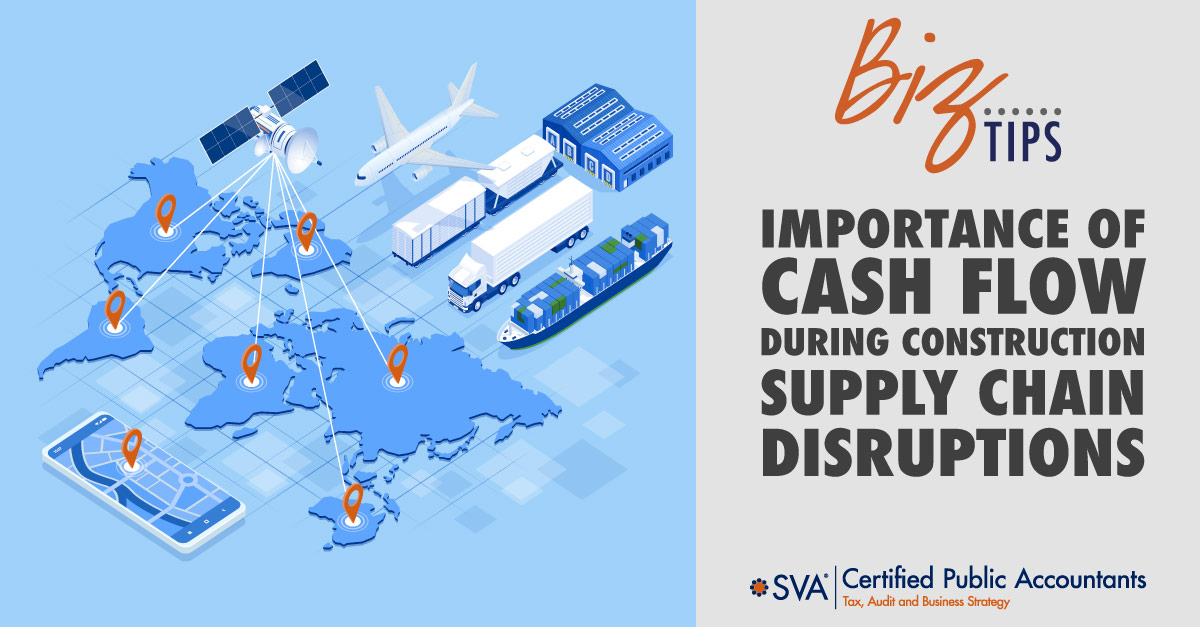The COVID-19 pandemic has caused, among many other issues, supply chain problems. We all remember seeing lumber soaring to ridiculous heights, but continued product and labor shortages, port delays, and production problems will also cause significant limitations in construction.
With higher prices and harder-to-find raw materials, sales can start to fall back, if they haven't already. Evaluating your supply chain strategy and its impact on cash flow must happen to keep your company profitable.
What's Causing the Shortages?
There are several issues causing supply chain disruptions including backed-up ports, raw material shortages faced by 71% of contractors, increased demand for new homes, renovations and DIY projects, and production delays due to material shortages.
These issues can have a strong impact on your schedule, existing contracts, and are even causing some construction firms to pass on work because of the extensive delays and high material costs.
The labor shortage is also causing serious problems including construction labor, as well as supply chain labor including truck drivers. Higher fuel costs are driving up the cost of shipping materials. Though many contractors have passed on these expenses and the related risks to their clients, others have branched out into alternative products or materials.
Some companies have chosen to retain storage space and are ordering their main materials ahead for the next year to year and a half. Other businesses are simply refusing to engage in the volatile market, holding off on any new construction until the market settles down. However, one aspect that many companies fail to consider is cash flow management to help mitigate their risk in this unpredictable market.
(Download Video Transcript)
Supply Chain Management to Reduce Risk
To start, you're going to need to set up a solid strategy for risk management before you start working on your cash flow.
It's easy to sit back and make a guess, even an educated one, on what will happen next. It's just as easy to react based on what could or could not happen in the market.
You'll get the best results from proactively looking at how your company is going to handle supply chain issues. To start:
- Review costs and processes so that you're using the best, most efficient method. Look at variable and fixed costs for unnecessary expenses that can be cut to improve cash flow.
- Consider whether improved supply will also impact your labor availability. Once the materials are in hand, can you employ enough workers for the project?
- Look at your most impacted vendors, then find backup options for when they're slow. Try to find nearby vendors to reduce transportation costs or small suppliers for particular project needs.
- Keep in touch with frequent vendors. Discuss what they're dealing with, how they'll adjust to the situation, and if they can handle future material demands. If they can't, ask for suggestions.
- Consider other work opportunities that are not as tied to the supply chain, which can help you explore other client types or projects to attempt.
Cash Flow Management Planning
Now that you have your supply issues in hand, it's time to look at cash flow management, which should be a regular practice. Use forecasting to better plan, track expenses, reduce risk, budget, and allocate your teams and equipment.
- Plan by identifying budget, construction milestones, and similar constraints. Know what you're working with and how to stay on track to meet those milestones.
- Track by comparing estimated versus actual expenses, schedule, and similar concerns. What's different between projects completed early versus late? Look for scope creep in projects as well as unexpected expenses.
- Manage risk by identifying and addressing risks as soon as they appear, whether this covers supply chain issues, cybersecurity, change orders, unexpected weather, or labor issues.
- Stay on budget by managing both expenses and revenue, working with cloud-based tech to get daily views of projected versus actual. Owners and management should be able to access this information quickly and easily.
- Resource management allows you to stay on top of your current workforce to manage both today's and tomorrow's projects, long into the future.
When you're projecting cash flow, consider at least three scenarios, but you'll want more in uncertain times. Use that information to make smarter decisions that are based on the data. Forecasting makes it easier to find the right times to buy or hold back based on labor, work delays, or materials pricing.
- You'll also want to communicate with lenders, who can help you find cash-saving opportunities on debt services while keeping track of lines of credit if the need arises.
- Use external accountants to find and develop working capital resources and cash flow strategies you may not have considered.
- Review billing and collections, undertaking a financial ratio analysis to check your performance against others in your industry.
- You can also revisit or set favorable billing terms with your suppliers for the time between invoice collection and payment.
These approaches can help you optimize your cash flow and supply chain, even during difficult times.

© 2021 CPA ContentPlus

